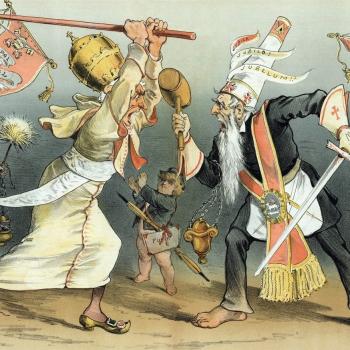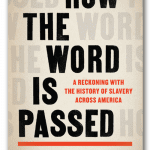
Acts 15:9 (RSV) and he made no distinction between us and them [the Gentiles], but cleansed their hearts by faith. [similar: Weymouth, ESV]
Protestantism formally separated sanctification from justification in a way contrary to the Bible. Justification saves through faith alone, according to their view. Sanctification and good works, on the other hand, are definitely encouraged and regarded as necessary in the Christian life, but are not a cause of either justification or salvation; only God’s grace and our faith accomplish that. This is the classic Protestant “faith alone” doctrine, or sola fide in Latin, and one of the two “pillars” of the so-called Reformation, along with sola Scriptura (“Bible alone”).
The above passage contradicts this understanding, by directly tying sanctification to faith. The fact that one is sanctified by having faith in Jesus (having a “cleansed” heart) makes it impossible to separate sanctification and justification in a neat little package with a bow. They’re intrinsically connected. Therefore, sanctification does have something to do with both justification and salvation. The faith was precisely the means by which their hearts were cleansed and they were sanctified.
Acts 15:11 ties this to salvation as well as to justification by faith: “But we believe that we shall be saved through the grace of the Lord Jesus, just as they will.” 15:8 mentions the indwelling of the Holy Spirit: “giving them the Holy Spirit”. 15:7 reiterates that it is justification as well: “hear the word of the gospel and believe.” It’s the cleansing of the heart and sanctification that aren’t “supposed” to be there, according to Protestant “faith alone” soteriology and the false belief in imputed justification. Other translations further clarify St. Peter’s meaning:
New International Version . . . he purified their hearts by faith.*Contemporary English Version . . . They put their faith in him, and he made their hearts pure.*King James Version / New King James Version . . . purifying their hearts by faith. [similar: Tyndale (1526), Coverdale (1535), Bishops’ Bible (1568), Geneva Bible (1587), Young’s Literal Translation, Smith’s Literal Translation; all but Bishops’ in the past tense]
***
“Please Hit ‘Subscribe’”! If you have received benefit from this or any of my other 4,600+ articles, please follow this blog by signing up (with your email address) on the sidebar to the right (you may have to scroll down a bit), above where there is an icon bar, “Sign Me Up!”: to receive notice when I post a new blog article. This is the equivalent of subscribing to a YouTube channel. Please also consider following me on Twitter / X and purchasing one or more of my 55 books. All of this helps me get more exposure, and (however little!) more income for my full-time apologetics work. Thanks so much and happy reading!
***
Jamieson-Fausset-Brown Bible Commentary: How rich is this brief description of the inward revolution wrought upon the genuine disciples of the Lord Jesus!*Matthew Poole’s Commentary: . . . the inward circumcision of the heart . . .*Geneva Study Bible: . . . here we are plainly taught that men are made pure of heart by faith.
*Adam Clarke’s Commentary: . . . the purification of the heart by the Holy Spirit was the grand object of the religion of God, and that alone by which the soul could be prepared for a blessed immortality, . . .*Barnes’ Notes on the Bible: Purifying their hearts – Thus, giving the best evidence that he had renewed them, and admitted them to favor with him. By faith – By believing on the Lord Jesus Christ. This demonstrated that the plan on which God was now about to show favor to people was not by external rites and ceremonies, but by a scheme which required faith as the only condition of acceptance. It is further implied here that there is no true faith which does not purify the heart.
Gill’s Exposition of the Entire Bible: Purifying their hearts by faith; which was done by implanting faith in them, and leading that faith to the blood of Christ, which cleanses from all sin, original and actual, with which men are defiled; for faith has not this efficacy in itself, but as it has to do with the blood of Jesus: and this spiritual purification being what answered to circumcision, made that unnecessary; for this is the circumcision of the heart, of which the other was only typical. The hearts of men are filthy, and need purifying; they are originally polluted with sin; this is the case of all men; and this defilement reaches to all the members of the body, and the faculties of the soul; and especially the heart is the seat of this impurity, which God only can cleanse: he promises to do it, and does do it; and he only can do it, men cannot; . . . the heart cannot be purified, neither by ceremonial ablutions, nor by works of moral righteousness, nor by humiliations and tears, nor by submission to Gospel ordinances, as water baptism, but only by the grace of God, and the blood of Christ; which the Spirit of God sprinkles upon the heart, and which faith looks to and deals with . . .
*
Practical Matters: Perhaps some of my 4,800+ free online articles (the most comprehensive “one-stop” Catholic apologetics site) or fifty-five books have helped you (by God’s grace) to decide to become Catholic or to return to the Church, or better understand some doctrines and why we believe them.
Or you may believe my work is worthy to support for the purpose of apologetics and evangelism in general. If so, please seriously consider a much-needed financial contribution. I’m always in need of more funds: especially monthly support. “The laborer is worthy of his wages” (1 Tim 5:18, NKJV). 1 December 2021 was my 20th anniversary as a full-time Catholic apologist, and February 2022 marked the 25th anniversary of my blog.
PayPal donations are the easiest: just send to my email address: apologistdave@gmail.com. Here’s also a second page to get to PayPal. You’ll see the term “Catholic Used Book Service”, which is my old side-business. To learn about the different methods of contributing (including Zelle), see my page: About Catholic Apologist Dave Armstrong / Donation Information. Thanks a million from the bottom of my heart!
*
***
*
Photo Credit: Christ Handing the Keys to St. Peter (c. 1482) by Pietro Perugino (1448-1523) [public domain / Wikimedia Commons]
Summary: I examine Acts 15:9: a Bible passage that I believe is manifestly contrary to the Protestant belief in “faith alone” (sola fide) for justification apart from sanctification.

















